- Home
- J. P. Donleavy
J.P. Donleavy: An Author and His Image Page 3
J.P. Donleavy: An Author and His Image Read online
Page 3
Publication day comes. The world does stop. But only for a fractional second as the sun sets just that bit more slowly than yesterday. There are no full page screaming advertisements or even book displays. But you did see an obscure review along with that photograph taken by the wife outside the welfare office. And the words beneath ‘shows promise’. And at the end of the review, ‘We should await his next book with interest.’ But luckily someone else has said, ‘This isn’t a book for the squeamish or to give your Aunt Christabel for Christmas.’ And such words have caught the attention of a few old friends who instead of calling you, call their lawyers. And if you have been honest enough to have written what you’ve felt and heard, you’ve also thereby invaded everyone’s privacy and held them up to ridicule and contempt, but you avoid being sued for libel because no one dare get up in court and say, ‘That’s me he’s writing about.’
However, following all the dashed hopes, renewed despairs and the unending, ‘Well I’m sorry I do read books, but I’ve never heard of you,’ finally, five years later just as you go down for the third time, voices are speaking up. A discerning few are beginning to discover the novel and say, ‘Gee you ought to read that.’ The book starts to sell. Someone wants to dramatize it, someone wants to reprint it, translate it and film it, and are offering money. The author at long last smiles, shakes his fist close up in his wife’s face and, mouth watering, runs to his contract. Alas he reads here, turns over and he reads there, but mostly he turns over again and reads where he finds the words ‘the Publisher shall exclusively negotiate all rights, including spinoff, character and merchandising, and receive 85 per cent of all monies accruing therefrom.’ After his first feeble moments of white faced anger the author searches in a pitch black soul for words of comfort, fairness and justice to temper his own screams of woe, ‘Those dirty rats, they never promoted my book, never advertised it, they let it die and here they are, five years later, jumping with both feet on to my gravy train.’
And yet when the author is writing his first book, it somehow exists, that words written on paper and unpublished are valueless. And they are. Till that day arrives when someone puts down five or more dollars to purchase these scribbles in their published form, when it dawns on the writer that he is in business. Just like anyone else. And the time now has come, if his outrage has left him any remaining sense at all, when the author goes to his local library and borrows his first volumes on contract and copyright. These are two subjects which never occur to him during the years sweating out his creative words. Believing as he blindly must that the world will always somehow discover, admire and reward genius. At least the author discovers, somewhat to his surprise, that copyright is a big pie, full of juicy fruits better known as licences and assignments, all of which can make money. And the author owns all of it. For a while. And for ever in two countries in the world. Portugal and Nicaragua.
Among the countries in which he owns least is the United States of America. Where fellowships, prizes and grants are poured down the throats of writers. Yet an author could not be ensured to receive the rightful earnings of his work, should he outlive the term of copyright protection, or fail to comply with the complicated regulations. Which until recently required you wake up on a certain morning and search your pocket for two dollars and write to Washington for the forms, and fill them out without a mistake, and send them back before twelve o’clock midnight, Sundays not included, on the last day following twenty eight years of publication. The situation resulting from such failure is known as public domain. Into which a living author’s work may fall. Which does not mean it benefits the public but does mean that publishers, who preach and breast beat in the name of art and letters, don’t have to pay an author a royalty on his work.
And this brings one to one last tool in the writing trade, a lawyer. That few writers can afford. Especially in their first eager innocent steps, which, should he survive these, then for the good author and the best author, litigation will be his lot. For folk, mistaking his heartfelt feelings expressed in his work for softness, and relying on his poverty, automatically try to make him the scapegoat of any dispute. Critics remain always his enemies. Except over the years they hopefully will take more and more print and space to condemn you. Invariably sneakily referring to criticisms of a previous book to see to what extent they dare degrade you with your presently published volume. And the author’s weapon at this period becomes silence. In which he remains sacred to that final word he puts on the page. But alas that one tool which the author needed in his first steps, and that he still now needs more than ever, is money.
Through all his traumas and through the too slowly waxing and the too quickly waning of his reputation, hopefully, you finally find the author safely arrived. To that acceptable but declining condition pleasantly known as his prime. Which means you are faintly branded as famous amid the growing hordes of people who have never heard of you. But odd invitations come to give talks at colleges. Interviewers again and again report your daily routine. From dawn nonstop till midnight changing typewriters as they overheat. Yet now you really are a writer. And if there is an occasional glow of joy it mostly comes when walking during your recreation. With a little wine and a little travel. And you may from your country house go up to town. To lie abed that night with a first class woman, in a first class hotel and next morning greet the world with interest. And find the charmingly literate hotel’s director has seen to a display of your work in the lobby bookstall. Breakfast is brought. Of buckwheat cakes with creamy melted butter and splashed with pure maple syrup and surrounded by rashers of bacon and golden toasted sausages. Stacked by your hand as you munch, the cities’ newspapers both saucy and serious. And you leisurely read while drinking your coffee. Having just listened pleased to sales reports from your most recent publisher on the telephone. And now you make an appointment for tea with an old pal who has long since forgotten he was at length libelled as an unsavoury character in your first novel.
And just as you settle into the lapsang souchong balmy accords of afternoon tea, merely one day like this can nearly answer why be a writer. Forever sweating on a page. Hoping still to find a few voices out there to echo back your own. And make you know another mind, kindred and understanding, has seen your ghosts, felt your love, and had his own worried loneliness broken and driven away awhile with laughter. And meanwhile you’ve lived the usual story. You can’t win. But if you don’t fight, you lose. And there is a victory. To remain a writer, reach the age of forty, be solvent and still love your trade.
1977
An Essay in Contemplation of Writing the Second Volume of The History of the Ginger Man
Since it involves despair and trepidations in the cities of London, Paris and New York one must be deadly serious about these following words as they are written out in the boglands of Ireland about these glamorous sounding destinations. And which were once and may remain especially alluring to women whose resolves of celibacy in the old days were occasionally weakened when they were by invitation drawn forth, às a magnet might, to what could be thought the illicit milieu of the foreign hotel bedroom. Particularly in Paris where the possibility of romance could be expected, if not always achieved, and where at least hotel proprietors did not blink an eyelash over the clearly lasciviously hell bent couple seeking accommodation.
But for me very little of that sort of dalliance was to be had in that idyllic city on the Seine which was to become for many years of my life a remote unfathomable dark world of jurisprudence complicated by the French language and the wonderful snobberies of its protocol. Now then. Who among you in this age of enlightenment is still antique enough to have ever heard of so called ‘dirty books’ that once were nearly the sole source of personal erotic entertainment handy to hand and brought back to English speaking shores and eagerly to be found by customs hidden deep in a traveller’s personal luggage. And who among you would know what it’s like to have a finger of outrage pointed or an accusing hatchetman from a tablo
id say you were corrupting the innocent and were purely, if not so simple, a filthy pornographer whose disgusting mind was his only stock in trade. And tomorrow’s headline would advise you to flee pronto for the obscurity of some thoroughly foreign and distant land.
Them times now are long gone and best forgot but ah suddenly persecutors all seem to be awake again and in a different guise. The euphemists raging are on the march and have invaded the publishing houses and the world of disseminated information, pointing to the new naughty and forbidden words which are no more allowed to be fictionally said of himself giving herself a well deserved fist in the gob or the root of a boot up the rear. And dare one say it, Paris, as in the past, is again culturally screaming awake and may now be the place of freedom of expression once more. Significant enough when you hear that the scholar’s pens are presently busily at work, dissecting a literary period, occurred just after the Second World War, and which has now over the ensuing years hugely come into being. Described in recent books such as Exiled in Paris by James Campbell, who, taking us vividly back to those times of personal liberation and exhilaration, re-enacts many a literary drama. John de St Jorre’s The Good Ship Venus in itself a wonderful study not only of the erotic voyage of The Olympia Press but also of those migrant displaced and alien persons who were the sailors and found Paris a congenial if temporary home.
And then comes that strangest and most curious figure of all, the great sexual liberator and founder of the Paris Olympia Press, and who became my nemesis and sworn enemy, and I his, and who was best known under the name of Maurice Girodias. But then let us dwell a little upon how things were then. The cheapness of living life in one of the most alive cities in the world. With idleness breeding dreams, literary history was to be easily made. There were endless boulevards to stroll, endless side streets to lurk in and numberless cafés in which to sit bemused. Because later your book would be published and fêted across America. Meanwhile the sale of a pair of slightly used shoes or the entitlement to your foreign visitor’s petrol coupons could finance two of you in an inexpensive hotel and provide meals for a fortnight. A bag of coffee beans would make you for at least a few hours a mogul attracting the girls. And even though one dined in elbow touching proximity to the French who always seemed to think one was going to steal an escargot or borrow their cutlery, it nevertheless never made the oeufs mayonnaise taste any the less wonderful. Which was why, if you hadn’t yet been there, the words, ‘Hey pal, you got to go to Paris,’ were on every American’s lips.
It was then with these now legendary literary figures, and with their books notching up notches on their writing belts, that Paris proved to be where it was all happening. Along with the pseudonymous pornographers there were the writers who were making their names known. Vladimir Nabokov, Allen Ginsberg, William Burroughs, Eugene Ionesco, Samuel Beckett, Richard Wright, James Baldwin and Christopher Logue to mention but a few. Alas, already retreating from the world of words, I of course, but for the single exception of Christopher Logue, whom I got to know later, knew none of them. Yet in the now distant retrospect I can see that I was, because of my own written words, none the less up to my oxsters in this literary demi monde which in France always bordered on the beau monde. But I was not to be seen in deep existentialist discussion over an aperitif in the café but rather with my nose in a tome of torts and with my tail nearly between my legs and slowly but surely becoming surrounded by lawyers, who, all having to sit down and read the book I wrote, were, ironically, becoming my first readers if not fans. With once fourteen of them all collected together in the sixteenth district near Avenue Foch animatedly having cocktails in the grand saloon of my very elegant principal counsel.
At the end of the first volume of The History of the Ginger Man I’d achieved publication in Britain and recognition with blasts of both praise and condemnation for this work and a victory over its first appearance in the pseudonymous and pornographic Traveller’s Companion series published by The Olympia Press. But I was not then to know, as several publishers, forty five of whom had previously turned the book down, were now fighting over the rights to publish it, that I was entering a battle which would nearly take up the remainder of my life. But in the vast struggle I was quickly learning things. It became early apparent that in all the opening forays, threats, claims, charges, torts, legal statements, ultimatums, writs, summonses, and where the author was caught in between, no instance ever arose where the scribbler was not immediately cited, to be castigated, inculpated and upon whom not only ridicule for obscenity could be heaped but all blame for legal costs and pecuniary damages could be dumped.
This is not to say that there are not some fair and wonderful people in publishing. But having said that, let me say this. Fairness and humanity sure did seem far removed from the salvoes of writs whistling over one’s head. And if a clause appeared able to catch the poor and ostensibly trembling author by the toe, so be it, the poor defenceless scribbler of obscenity deserved it. And yours truly started digging in the law. And where a statute could be shoved down some bully’s throat or a clause tightened around his neck, the scribbler only hesitated that moment or two in the interests of historically preserving the concept of courtesy. One’s life became seclusion and caution. Friendly correspondence came to a halt. Social occasions became lawyers’ meetings. Which surprisingly were not always gloomy and indeed gave me moments during which I took comfort from these astute gentlemen, who were by their professions made wise in the ways of life. And who indeed I found could give their intellectual utmost to the protection of one of their poorer clients.
Ah but many out in the wide, wide world don’t know authors. He who by the nature of his profession must get his daily bread from day dreaming thoughts which get turned into words. Like, you no good dirty rat. And the author, as all authors do when pushed, and in dealing with their written remarks, can get just as clever as the cleverest of lawyers, and into whose mouths the author will even suggest those phrases, which only by rude intent prevent their usefulness. And certainly having levered myself up out of innocence, I seemed to be getting increasingly concerned over who got their hands on the money as this seemed to be the most desired prize to be gained by the publishers and their retinue of legal advisers. I was to learn quite early on that the great litigator himself, Maurice Girodias, was heard to say, ‘That bastard Donleavy for all his wallowing in self pity is possessed of an astute naïvety.’
The Ginger Man was burgeoning, revenue plonking into coffers. Publications here, publications there, publications everywhere. The pot getting larger and larger for every throw of the dice. With piracy rearing its unpleasant head even new enemies were cropping up and urgently needing to be wiped out. As time and a few further educating trials and hearings went by, trips between Paris, London and New York increased as one retreated deeper and deeper into a not unpleasant seclusion. It no longer seemed strange to come out of one court room, fly to another continent and city and within hours enter another chamber of law. As a little victory here and a little victory there occurred, it became less and less that blame was heaped upon and the scribbler himself made a scapegoat. In fact it was becoming apparent that folk were hesitating to use or even mention my name at all. My implacable obstinacy had somehow grown in the minds of my adversaries to be something to be reckoned with along with a few of my earlier precautionary cables such as:
Gentlemen
Only For
The Moment
Am I Saying
Nothing
These words put together homemade I regarded as the quintessence of all letters written by all lawyers. I had learned, too, that when it came time to say something a little more descriptive, such as estimating an assessment of damages, it was a good thing to make the numerals quite odd sounding sums like $300,946.22, and immediately below in the communication, spell out in capitals:
THREE HUNDRED THOUSAND, NINE HUNDRED
AND FORTY SIX DOLLARS AND TWENTY TWO CENTS
Amazingly no one
seemed to mind what the Three Hundred Thousand Dollars was for, but my opponents would call in high powered consulting lawyers from distant cities to analyse and find out what the Nine Hundred and Forty Six Dollars and especially the Twenty Two Cents was about.
And finally a new image of the author was to emerge when I unexpectedly found myself on the eighteenth floor of an old sky scraper in a prominent if not fabled New York law office and being subjected to an interrogation on the basis that I happened to be available in New York. Modestly but neatly tailored and in my best innocent manner I proceeded with my own highly respectable and even somewhat stylish legal counsel to such interrogatory as was to be held in my opponents’ mahogany panelled chambers. Having now got thoroughly used to the non emotional pincer movements of the legal profession I found myself faced over a desk by a most hostile gentleman who, as a lady stenographer got ready to record proceedings, had just finished shoving a handful of pills into his mouth. I waited for those first few words usually said of a timidly jocular nature and which never succeeded in allaying one’s deeply depressing trepidation but were meant to attempt to convey that should you capitulate, you’ll find we’re all adult reasonable people underneath our vicious attempts to wipe you out. And then just as I put on my most benign air, suddenly this crouched to spring attorney-at-law, glaring from behind his desk, half rose up and, knocking over his vial of pills, blurted out, ‘Do you know what you are. You’re nothing but an international litigator bringing innocent corporations to their knees.’

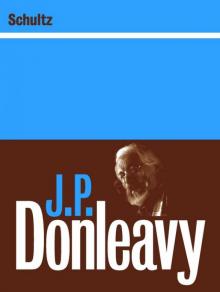 Schultz
Schultz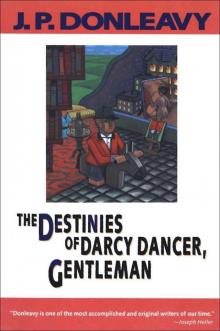 The Destinies of Darcy Dancer, Gentleman
The Destinies of Darcy Dancer, Gentleman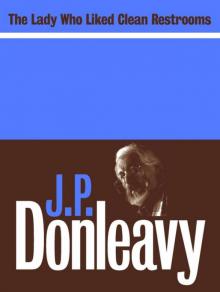 The Lady Who Liked Clean Restrooms
The Lady Who Liked Clean Restrooms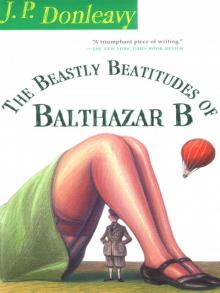 The Beastly Beatitudes of Balthazar B
The Beastly Beatitudes of Balthazar B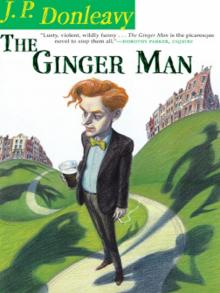 The Ginger Man
The Ginger Man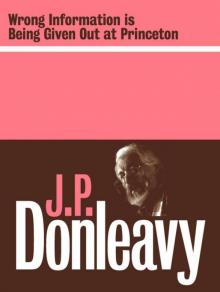 Wrong Information Is Being Given Out at Princeton
Wrong Information Is Being Given Out at Princeton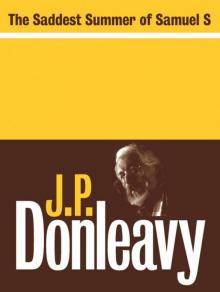 The Saddest Summer of Samuel S
The Saddest Summer of Samuel S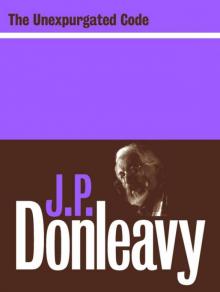 The Unexpurgated Code
The Unexpurgated Code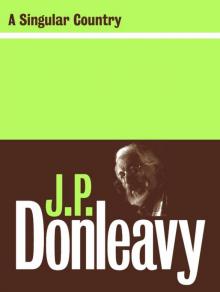 A Singular Country
A Singular Country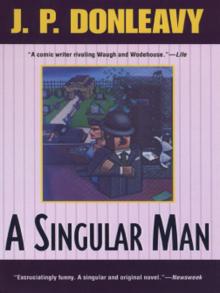 A Singular Man
A Singular Man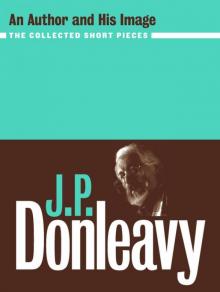 J.P. Donleavy: An Author and His Image
J.P. Donleavy: An Author and His Image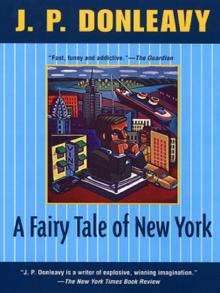 A Fairy Tale of New York
A Fairy Tale of New York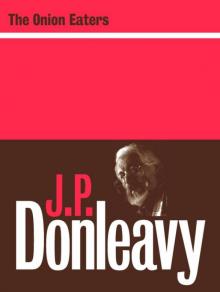 The Onion Eaters
The Onion Eaters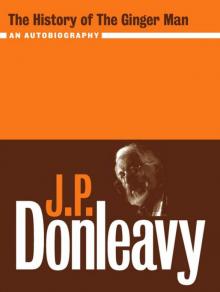 The History of the Ginger Man: An Autobiography
The History of the Ginger Man: An Autobiography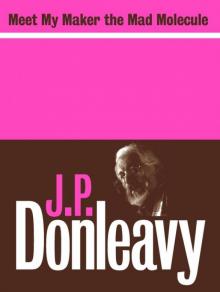 Meet My Maker the Mad Molecule
Meet My Maker the Mad Molecule Leila
Leila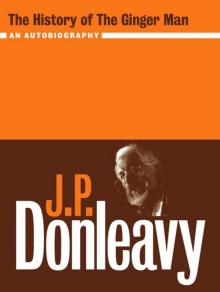 The History of the Ginger Man
The History of the Ginger Man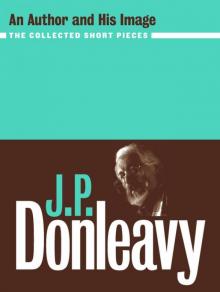 J.P. Donleavy
J.P. Donleavy